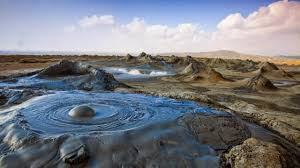 |
| Mud Volcanos in Gobustan, Azerbaijan |
Bond villains, war criminals, mud volcanoes and ununderstandable Scottish accents in this weeks Camino a Ítaca. It's the second year in a row that the United Conference Conference Climate Change conference (COP29) has been held in a fossil fuel dependant state and the watered down results are sadly foreseeable. We think we have so much choice, but do we? Click over to read the originally published piece in Spanish in the HOY or read the English translation below. This was also picked up in SUR in English. (PDF en castellano abajo)
The freshly laid blacktop
rolled out from Baku across the dun Gobustan desert like a strip of electrical tape
vainly adhering to the surface of a sandbox. Its very newness was a political
statement against the antediluvian moonscape, complete with gurgling mud
volcanoes, that stretched out from the bus’s tinted windows. It was a Monday
morning and the highland Scots oil technicians sitting around me were regaling
each other about their weekends in a shared language I could barely understand.
We saw them before they
could even be heard. Tremendous dust storms raised up out of the desert as a
pair of Apache helicopters buzzed past followed by two bigger transport
helicopters. One of which landed in the middle of the highway ahead and
disgorged a squad of troops that blocked the road. The American Secretary of
Defense, Donald Rumsfeld, was visiting the gas terminal where we were headed,
and it was about to be inaugurated.
We weren’t going to work
today. Geopolitics had literally landed in our path out in the wastelands of
Azerbaijan.
It’s been 20 years since
that pipeline opened the flow of gas from the Caspian to its terminus in
Turkey. Then, that highway was the only new road to have been built, let alone
repaved, since the USSR had collapsed some 15 years prior. Now, after 20 years
of gas revenues, the petrocity on the finger-like peninsula sticking out into
the world’s largest inland sea looks like Dubai on the fringes of the Central
Asian steppe.
Its oil riches have also
served to help establish it as a regional powerhouse. Projecting it onto the
international stage by hosting large events like Eurovision, the Azerbaijan
Grand Prix and most recently the United Nations Climate Change Conference. The
second consecutive year the conference has been held in a fossil fuel dependent
state.
Azerbaijan’s autocratic
president Ilham Aliyev took over the reigns of the small ex-Soviet
nation more than 20 years ago from his father Heydar Aliyev. Himself a former
high ranking KGB officer who morphed into a Bond-style Central Asian strongman.
The type with shark tanks in their plush offices who enjoy boiling opposition
figures and journalists in vats of oil.
His son has tempered down some of those strongman excesses
but continues to maintain a tight grip on the country, prompting the OSCE to
state that the recent parliamentary elections “did not offer voters genuine
political alternatives and took place within a legal framework overly
restrictive of fundamental freedoms and the media…”
This week Aliyev told world leaders gathered for
COP29 that natural gas was a “gift from God” and that the country shouldn’t be
blamed for bringing it to market. He
went on to expose hypocritical Western governments who buy his gas and lecture
him about torching the planet, “Unfortunately double standards, a habit to
lecture other countries and political hypocrisy became kind of modus
operandi for some politicians, state-controlled NGOs and fake news
media in some Western countries.”




No comments:
Post a Comment